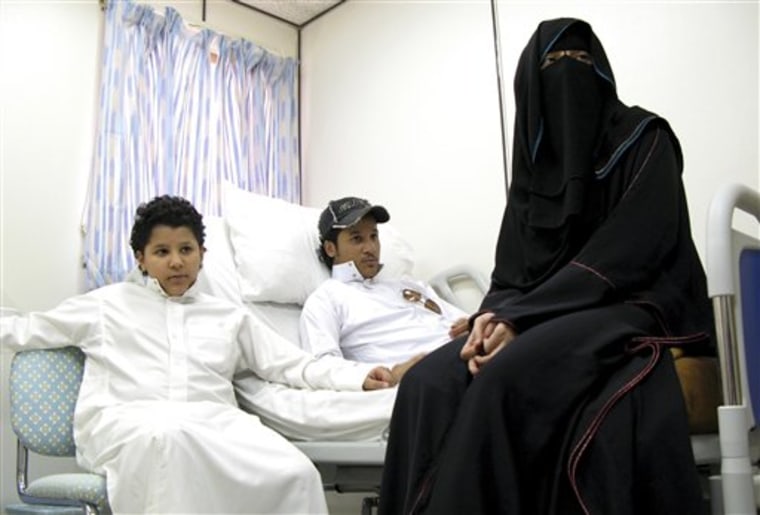When Ruwaida al-Habis' father and two brothers were badly burned in a fire, she had no choice but to break Saudi Arabia's ban on women drivers to get them to a clinic.
Using the driving skills her father taught her on the family farm, al-Habis managed to reach the clinic's emergency entrance without a hitch.
"When I pulled up, a crowd of people surrounded the car and stared as if they were seeing extraterrestrial beings," the 20-year-old university student told The Associated Press. "Instead of focusing on the burn victims, the nurses kept repeating, 'You drove them here?'"
Saudi Arabia is the only country in the world that bans all women — Saudi and foreign — from driving. The prohibition forces families to hire live-in drivers, and women who cannot afford the $300-$400 a month for a driver must rely on male relatives to drive them to work, school, shopping or the doctor.
But there are signs support for the ban is eroding.
Al-Habis' story was first published in one of the biggest Saudi newspapers, Al-Riyadh — which even called her "brave." Her father, Hamad al-Habis, praised his daughter's action.
"Why should it even be an issue?" said Hamad al-Habis in his hospital bed. "My daughter took the right decision at the right time."
Al-Habis is one of several women whose driving has made headlines. It is not clear whether the reports are a sign that more women are driving or that newspapers are just more willing to report about them. But in either case, it suggests the long-unquestioned nature of the ban is eroding.
Door opened for change
That may in part be because of signals from the top: King Abdullah, considered a reformist, has said the issue is a social one, not religious, opening the door for society to spur change.
Previously, women who spoke out against the ban paid heavily. In November 1990, when U.S. troops were in Saudi Arabia following Iraq's invasion of Kuwait, some 50 women drove family cars in an anti-ban protest. They were jailed for a day, their passports were confiscated and they lost their jobs. The reaction was so harsh that lifting the ban was barely broached again until recently.
Recent media reports have highlighted women driving not as organized protests, but out of necessity or just a desire to be behind the wheel. Five women were briefly detained in separate incidents across the kingdom.
One was a 47-year-old woman detained by the religious police after they received calls from Saudis who had seen her drive repeatedly in the eastern city of Qatif, said Muhammad al-Marshoud, a member of the Commission for the Promotion of Virtue and the Prevention of Vice, speaking to Al-Watan newspaper.
Another was arrested in the central city of Buraida while driving to pick up her husband from a car show, Maj. Fahd al-Habdan told Al-Hayat newspaper. She was released after her husband promised his wife would not do it again.
Last month, two women died while driving. One, in her 20s, was speeding in a family car when she hit an electricity pole in Riyadh. The second, in her 70s, died in a collision with another car in the northern region of Hail.
Supporters of ending the ban on female drivers point out that the prohibition exists neither in law nor in Islam. There is no written Saudi law banning women from driving, only fatwas, or edicts by senior clerics that are enforced by police. No major Islamic clerics outside the country call for such a ban.
Sinful temptation?
Conservatives say women at the wheel create situations for sinful temptation. They argue that women drivers will be free to leave home alone, will unduly expose their eyes while driving and will interact with male strangers, such as traffic police and mechanics.
Many Saudi women own cars and have driver's licenses from countries where they have studied or lived. Some, like al-Habis, an English major, have learned to drive in remote desert areas, where practicality sometimes outweighs ideology and it's more acceptable for women to drive tractors and water tankers, or even cars short distances.
Hamad al-Habis, 50, an airport inspector, said he taught his wife and four daughters to drive so they can cope in an emergency. He said he even gave them rudimentary tests — by using tree branches to make roads narrower and winding — to make sure they can park and drive on difficult roads.
Last September, a group of women formed the Committee of Demanders of Women's Right to Drive Cars to lobby for the right to get behind the wheel, collecting more than 3,000 signatures. They have sent two petitions to Abdullah, committee member Wajeha al-Huwaider said.
Moving forward
To mark Women's Day in March, al-Huwaider posted a video of herself on YouTube driving in the Eastern province.
Surprisingly, the government did not try to stop the group from collecting signatures or punish al-Huwaider for her bold move.
Al-Huwaider said that's an encouraging sign, leading her to believe that women will start driving by the end of the year.
"We have moved forward since last year," said al-Huwaider. "There's more awareness and discussion of the topic."
At the hospital where her father and brothers were being treated for leg burns, al-Habis described her 10-minute drive through the streets of Riyadh.
"I didn't feel nervous," she said, her face covered by the traditional black niqab.
Her dream, she said, is to start driving her favorite car soon.
"I want a Ferrari, a pink one. I love the roar it makes."
